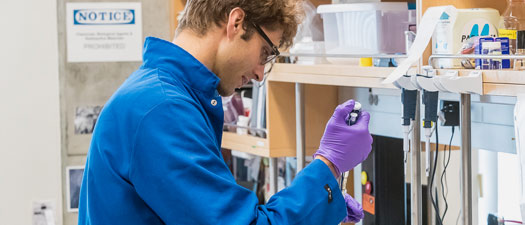Basic Science and Translational Research

The UCI Anesthesiology & Perioperative Care basic science and translational researchers have multiple laboratories committed to research excellence.
Addiction and Behavioral Pathology
The Ostlund Lab research interest focuses on the investigation of neural mechanisms of decision making and motivated behavior, including how chronic drug use impacts the brain to support pathological drug-seeking behavior. A multidisciplinary approach is applied to measure and manipulate the activity of genetically and anatomically targeted neural circuits in rodents performing sophisticated behavioral tasks. Determining how ascending dopamine systems contribute to behavior is a major area of study in the lab. Fast-scan cyclic voltammetry and microdialysis are used to characterize distinct aspects of dopamine signaling to determine their relationship to learning and behavior and how this is altered in addiction and other pathological states. A range of strategies, including chemo and optogenetic tools, are used to selectively perturb the function of dopamine and other neurochemical signaling pathways to determine their specific contributions to behavior.
Genetics and Spinal Control of Pain Perception
The Luo Lab research interests focus on molecular mechanisms of chronic pain. Z. David Luo, MD, PhD and a team of research associates study how chronic pain inducing conditions, such as peripheral nerve injury, bone cancer and spinal cord injury, induce changes in gene expression in sensory pathways that lead to changes in pain perception.
Two approaches are utilized in Dr. Luo’s research. The first approach is using gene chip analysis to compare gene expression profiles between control and experimental tissue samples, taken from pathological conditions associated with abnormal sensations, to identify genes that may be the molecular determinants of specific nociceptive states and serve as targets for the development of more specific and safer analgesics.
The second approach is to study how altered target gene expression contributes to spinal sensitization, a central mechanism of abnormal sensations. Using techniques of behavioral pharmacology, cellular and molecular biology and immunohistochemistry to study how these genes are regulated under pain-inducing conditions and how these changes contribute to abnormal sensation development and maintenance. Dr. Luo’s team is also focusing on developing and validating novel interventions for chronic pain management.
Neuroimaging, Consciousness, & Anesthesia
The Alkire Lab research interest focuses on the investigation of the mechanisms of anesthetic action on learning, memory, consciousness and pain processing. Neuroimaging technologies such as positron emission tomography (PET), functional magnetic resonance imaging (fMRI) and high-density electroencephalography (EEG), as well as small animal experimentation are used to identify and experimentally manipulate various key sites of anesthetic action in the brain.



